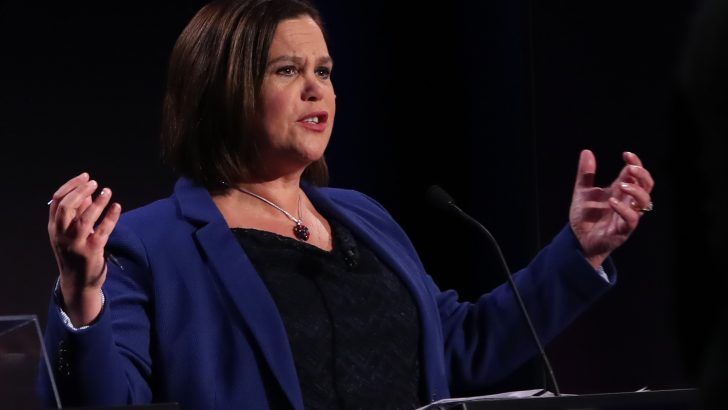The View
It really is a case of being careful what you wish for. When I wrote before the election that it was time to move away from the politics of Tweedledum and Tweedledee, I had no idea that the country would instead vote for Tweedledodge.
In fairness, neither did Sinn Fein, which could have comfortably elected two people in many constituencies where they only ran one candidate. It is clear that this is a vote for change and for Mary Lou McDonald as an avatar for that change.
For example, Patricia Ryan topped the poll in Kildare South. She herself obviously believed she had so little chance that she went on holidays for the last days of the campaign.
Violet-Anne Wynne in Clare topped the poll with more than 8,700 votes but got 385 votes in the local election. This has been repeated right across the country.
It may seem unfair to refer to Sinn Fein as Tweedledodge, but Peadar Toibin of Aontú, who was a member of Sinn Fein until he parted ways with them over abortion, has claimed that rank and file TDs have zero influence on policy. It is often dictated by unelected officials.
More importantly, leader Mary Lou McDonald was embroiled in controversy over the death of Paul Quinn, a young man beaten to death in grisly circumstances thirteen years ago. Conor Murphy, finance minister in the Stormont government, had made comments connecting Quinn to criminality (Murphy himself was sentenced to five years in jail for IRA membership and possession of explosives). McDonald, when confronted with what Murphy had said, was obviously discomfited and ended up saying that Murphy would have to apologise. Even this did not affect Sinn Fein in the polls to any significant degree.
Necessary
In the context of a Sinn Féin surge, it was an even greater achievement for Peadar Toibín to get elected in Meath. Aontú will fall short of the 2% of the vote necessary to secure government funding.
However, Becky Kealy in Cork and Sarah Reilly in Cavan Monaghan put in very creditable performances.
In my own constituency of Dublin Rathdown, filled with heavy hitters like Catherine Martin of the Greens, Josepha Madigan of Fine Gael and Independent Shane Ross (who lost his seat), Liam Coughlan of Aontu managed to secure some 1,400 votes.
There is definitely a foundation to build on here but anyone looking at the election would say that there was a curious indifference to issues like abortion. It seemed neither to help nor harm candidates.
Certainly, Fianna Fáil’s courting of the liberal/left and ‘woke’ electorate did them little good. Fine Gael’s characterisation of those who oppose abortion as ‘backwoodsmen’ did them no additional harm.
The election results seem to have come down to a boiling over of frustration with housing (for younger people) and health (for older people). Yet Simon Harris was re-elected even though he was the worst Minister for Health in living memory, as was Eoghan Murphy who was Minister with responsibility for (not enough) housing. Climate change did not feature much as a motivation for voters, even though the Greens did well.
Volatility and unpredictability are the new political realities. How do Catholics, who tend to have unchanging priorities, such as the right to life, decent living conditions for all and care for the planet, fit into such a scenario?
The only way to bring about change in politics is to get out and get stuck in and help candidates who mirror your values.
Catholics will have to stop compartmentalising their vote as something separate from their Faith”
No political party is perfect and no government will bring about the reign of the kingdom of God. But nothing can excuse us from the long unglamorous slog of everyday politics, even if it takes decades. It means supporting parties like Aontú and Independents who reflect our values most closely.
Catholics will have to stop compartmentalising their vote as something separate from their Faith. They will have to stop voting for parties that hold views that are completely at odds with Catholic values.
Some parties bank on Catholics not punishing them at the polls.
One of my daughters did some canvassing for a pro-life politician and said that it was the first time that she understood why someone would want to be a politician. Canvassing brought her in contact with lots of young families struggling with long commutes, suffering from inadequate facilities for children with disabilities or mental health problems, or simply unable to afford a secure home.
It made her realise that there is a vocational aspect to politics that is motivated by a desire to make a positive difference in people’s lives.
Even in a rapidly shifting and volatile political landscape, that unglamorous but vital aspect of politics is both important in its own right and also makes people more inclined to listen on issues like abortion.


 Breda O'Brien
Breda O'Brien Mary Lou McDonald
Photo: AP/IrishSun
Mary Lou McDonald
Photo: AP/IrishSun 